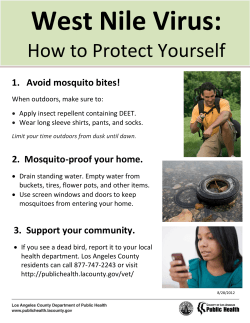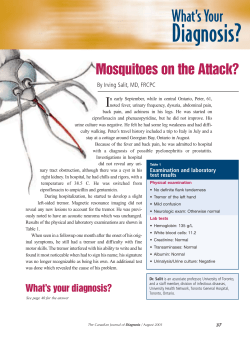
May 2, 2012
Steven E. Smith, M.P.A. Health Director Timothy J. Shea, M.D Medical Director May 2, 2012 Transylvania County has recently seen a significant increase in diagnosed cases of mononucleosis, particularly in children and adolescents. Mononucleosis is not a reportable communicable disease, so it is difficult to determine exactly how much of an increase in the number of diagnosed cases we are experiencing this year. With such a wide geographic and age spread of cases it is hard to connect the recent increase to any particular environment or risk factor within the county. Transmission Infectious Mononucleosis, or “mono,” is a common viral illness that tends to leave you feeling tired and weak for weeks or months. Often called the “kissing disease,” the virus that causes mono is transmitted from person-to-person through saliva, so you can get it through kissing. The virus can be spread from items contaminated with saliva, for example: hands, toys, drinking glasses and bottles, eating utensils, food, cigarettes, water fountains, etc. Additionally, mono can also be spread through contact with mucus from the nose and throat, such as exposure through a cough or sneeze. Symptoms Mononucleosis is caused by the Epstein-Barr virus (EBV) and is most often seen in adolescents and young adults. While infants and young children can get the virus, it often goes unnoticed because their symptoms are generally mild. Older adults usually do not get mono, because they have immunity to the virus. You're most likely to get mononucleosis with all the signs and symptoms if you're an adolescent or young adult. Most cases of infectious mononucleosis go away by themselves over two or three weeks with plenty of rest. During the course of illness, patients often have days when they feel well, alternating with days when they feel ill. Signs and symptoms of mononucleosis may include: fatigue, weakness, sore throat, perhaps a strep throat that doesn't get better with antibiotics, fever, swollen lymph nodes in your neck and armpits, swollen tonsils, headache, skin rash, loss of appetite, soft, swollen spleen, and/or night sweats. Symptoms usually start four to six weeks after you are exposed to the virus, although in young children this period may be shorter. Signs and symptoms such as fever and sore throat usually lessen within a couple of weeks, although fatigue, enlarged lymph nodes and a swollen spleen may last for a few weeks longer. If you are experiencing the symptoms listed above, contact your health care provider for an appointment. 98 E. Morgan Street • Brevard, North Carolina 28712 • Phone (828) 884-3135 • FAX (828) 884-3140 Treatment There's no specific therapy available to treat infectious mononucleosis. Antibiotics don't work against viral infections such as mono. Your doctor will ask you questions about your symptoms and examine you. You may also need blood tests to check for signs of mono and the Epstein-Barr virus. Treatment mainly involves rest and adequate fluid intake. If you have mononucleosis, it's important to be careful of certain complications such as an enlarged spleen. Avoid contact sports and heavy lifting because the impact or strain could cause rupture of the spleen. Rest and adequate fluids are key to recovery. Prognosis The major symptoms typically last 2-4 weeks followed by gradual recovery. As soon as you get over mono, your symptoms will go away for good, but you will always carry the virus that caused it. Second attacks of infectious mononucleosis caused by Epstein-Barr virus have not been documented. Occasional persistence of fatigue for a few years is well recognized. The virus may become active from time to time without causing any symptoms. When the virus is active, it can be spread to others. Typically the spread of the virus requires close contact, so as long as the infected person is feeling well and their health care provider has not said otherwise, they do not need to be kept home. Students can return to school when they are fever free for 24 hours without using fever reducing medication. You can avoid exposure to the virus by not kissing anyone, not sharing a glass or food utensil, not sharing food, not sharing toothbrushes, and avoiding other contact with saliva or mucus. Proper handwashing measures should be in place throughout the day to help prevent the spread of disease as well as additional sanitizing measures for lavatories and water fountains. Please be sure to discuss modes of possible transmission and emphasize methods to avoid exposure with your child. For more information on mononucleosis, please visit: http://www.webmd.com/a-to-z-guides/infectious-mononucleosis-topic-overview http://www.mayoclinic.com/health/mononucleosis/DS00352 http://www.cdc.gov/ncidod/diseases/ebv.htm http://www.dhs.wisconsin.gov/publications/P4/P42063s.pdf (version de espanol) If you have further questions or concerns, please contact the Communicable Disease Nurse at (828) 884-3135. 98 E. Morgan Street • Brevard, North Carolina 28712 • Phone (828) 884-3135 • FAX (828) 884-3140
© Copyright 2025





















